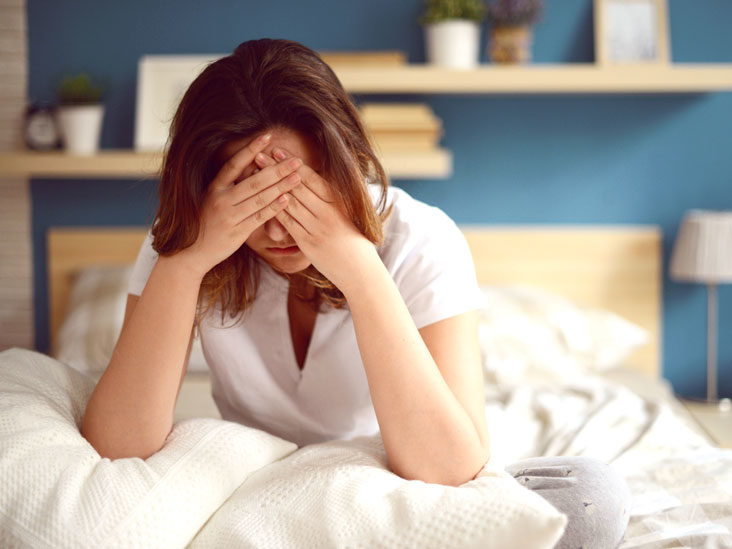Tired, exhausted, lacking energy all day long is what people feel in everyday life, especially in spring, when long days and temperature fluctuations disrupt hormone levels. Sometimes fatigue is associated with an undetected illness, but often also stress and lifestyle.
A snooze button, intense yawning, and one coffee after another to combat fatigue are part of a normal morning for some. But for many, exhaustion becomes permanent. Those who suffer from such chronic fatigue often pass the day sleepily and without drive. Poor sleep also increases the risk of illness, especially depression and cardiovascular disease. If you are aware of your fatigue, you can take specific countermeasures.
In this article, you will learn how chronic fatigue occurs, what you can do about it, and what about Spring Fatigue and Chronic Fatigue Syndrome (CFS).
Why do people get tired?

According to a poll conducted by the American Centers for Disease Control and Prevention, about 15 percent of Americans feel constantly tired, women are much more likely than men. International studies have shown that, depending on the region, 2 to 15 percent of people suffer from constant fatigue with an unclear cause, for example, in Germany, 11 percent. In spring people get tired especially often – they talk about spring fatigue. And in rare cases, chronic fatigue syndrome occurs, in which victims are completely exhausted from everyday activities.
What happens in your brain when you’re tired?
Fatigue occurs in the brain. In the evening, when there is almost no light in our eyes, the body begins, in the sleep hormone melatonin there is the hormone of happiness serotonin. As a messenger, melatonin initiates a series of processes that tire us out and then ensure that we fall asleep and sleep within.
The feeling of fatigue arises, among other things, from the messenger substance adenosine. The longer we stay awake, the higher the level of adenosine in the brain. Adenosine inhibits, among other things, the stimulating hormones dopamine and norepinephrine – and makes us so tired. Caffeine is the enemy of adenosine, it can block the messenger. This is probably the effect that coffee, black tea and cola keep us awake.
Did you know? Fatigue after intercourse is scientifically recognized, especially among men. After sex, the hormones oxytocin and prolactin are released, which can make you tired. There’s even a technical term for that: postcoital fatigue.
Fatigue and sleep patterns
Exactly when we get tired also depends on our circadian rhythm, a rhythm of about 24 hours, which depends on our brain’s internal clock is controlled. This rhythm is somewhat different for everyone – it explains that some people get tired early and like to get up early in the morning, while others are real night owls.
The internal clock controls, for example, the rhythm in which levels of melatonin and the stress hormone cortisol rise and fall day and night to sink. Anyone who has survived the night knows this phenomenon: as soon as a certain “sore point” is overcome, the greatest drowsiness disappears. This is due to the internal clock, which returns to wax at the latest in the morning.
Why do we yawn?
For some researchers, yawning is a means of communication that humans and animals use to coordinate their sleep. Others suspect that it pumps fluid through the brain. New theory: yawning cools the brain and protects it from overheating, making us more alert and clear in our heads. By the way, we do not just yawn when tired: Stress is the same trigger as boredom, and some athletes deliberately yawn right before the competition to clear their heads [9, 10].
Did you know? Yawning is highly contagious – as researchers recently discovered, not just between humans. Dogs and their mistresses and owners can obviously yawn at each other.
What are the causes of chronic fatigue?
A little yawning and soothing sleepiness before bed is not a problem. However, if fatigue becomes persistent and you feel drained and lack of energy throughout the day, it can be quite alarming – and a sign that something is wrong with your body. Before you can do something about chronic fatigue, exhaustion and lethargy, you first need to find the reasons.
How do lifestyle and environment contribute to fatigue?
In most cases, the things that tire us constantly can be found in our daily life and behavior. Recognizing and taking action against day-to-day fatigue can already help you combat exhaustion. Typical reasons:
- Poor sleep, staying up late, shifted sleep-wake rhythm
- Chronic stress and burnout or persistent boredom
- Obesity and fatty, high-calorie foods
- Underweight and malnutrition (lack of vitamins and nutrients)
- Lack of exercise
- Dry, warm air with low oxygen content, such as in open-plan offices or classrooms in schools
Sleep disturbances and fatigue
The obvious cause of chronic fatigue is poor sleep. If the rest of the night is always too short or not soothing for other reasons, it affects fitness during the day. Sleep disorders can have a wide variety of causes, the most common of which are mental illnesses such as depression and anxiety disorders, severe overweight (obesity) and obstructive sleep apnea, one Breathing disorder that occurs during sleep.
The problem is widespread: scientists have analyzed sleep habits in seven European countries. 10.8% of the surveyed suffered from restless sleep. Most of those affected were in the UK (16.1 percent) and Germany (15.5 percent).
Here are 11 tips to help you sleep and sleep through the night!
Tired of lack of exercise?
If you exercise too little, you get tired – it sounds convincing and scientifically proven. Doctors specifically prescribe physical exercise and training to combat pathological fatigue, that is, with sports or exercise in everyday life. For example, studies have shown that people with cancer and rheumatoid arthritis feel less tired when exercising.
What drugs make you tired?
Fatigue also occurs as a side effect of certain medications. A well-known example is antihistamines, which are mainly used against allergic reactions. However, the new active ingredients are considered significantly more tolerable. Scientists have found low fatigue potential, especially for loratadine, while the active ingredient cetirizine appears to cause fatigue in some people. Antihypertensive drugs (beta blockers) and antidepressants regularly make you tired.
What diseases cause fatigue?
Chronic fatigue is especially common in chronic diseases. In a UK study, 50% of chronically ill people felt tired and exhausted, compared with 34% of healthy people. Diseases that commonly lead to fatigue include heart failure, kidney failure, Parkinson’s disease, multiple sclerosis, COPD, cancer, and rheumatoid arthritis.
Fatigue is also often associated with mental illness, especially depression and anxiety disorders, as well as infections like the common cold and pneumonia. Daytime fatigue is especially pronounced in winter depression.
Lack of vitamins and minerals
Anemia (anemia) can also make you tired – often it is due to vitamin B12 deficiency or iron deficiency together. Apparent iron deficiency is also thought to be a cause of fatigue and is relatively common in women of childbearing age. For people who are iron deficient and at the same time suffering from fatigue, it makes sense to pay attention to an iron-rich diet or take iron supplements sold without a prescription. A serious deficiency should be checked by a doctor.
In addition, celiac disease can lead to fatigue if people are not aware of their gluten intolerance and adjust their diet accordingly.
Poisoning by carbon monoxide and other pollutants
Carbon monoxide is a relatively common cause of poisoning. Besides dizziness, headache and nausea, fatigue is a signal for carbon monoxide poisoning. Broken coal and gas stoves are often responsible for releasing too much toxic material into the air.
Chronic poisoning with heavy metals such as lead and mercury can also cause chronic fatigue. Some people with mercury-containing amalgam fillings attribute complaints such as tiredness and fatigue to the amalgam. However, there is no scientific evidence for this. Some researchers suspect that psychosomatic complaints, or so-called somatization, often arise behind suspected amalgam poisoning. This means a tendency to blame feelings of illness and various complaints about a non-existent disease.
Good to Know: Anyone who researches on the Internet what diseases can lead to fatigue and exhaustion will quickly come to disturbing results. In fact, there are usually other symptoms of serious illness – fatigue is so common that it is not, in itself, a sign of anxiety. If you are constantly tired for a long time, you should still clarify your complaints.
What is Spring Fatigue?
In the spring, many people suffer from exhaustion and fatigue, lethargy and headaches. This phenomenon appears to be taking place, especially in regions where temperatures and lengths of days in winter and summer vary greatly, such as in Europe and North America. Spring fatigue is probably due to the fact that our body switches to a kind of resting mode in winter, from which it does not leave directly when the temperature gets warmer again.
Why do many people feel tired in spring?
According to the theory, spring fatigue is mainly due to hormonal changes in the body: in the spring, the level of the sleep hormone melatonin, the waking happiness hormone serotonin, decreases more and more often. The body has to adjust to this – which can lead to fatigue, exhaustion, and lethargy in some people. The body also dilates the blood vessels, thereby lowering blood pressure, which can also cause fatigue.
What can I do about spring fatigue?
What Can Help: Exercise helps your body switch from winter to summer. It is best to do this outdoors and take as many spring suns as possible with you. There are receptors in your eyes that respond to sunlight and switch your brain to be awake and more serotonin. Positive side effect: the sun stimulates the production of vitamin D. A balanced diet with plenty of fresh fruits and vegetables is beneficial for replenishing vitamin and mineral reserves.
Chronic Fatigue Syndrome (CFS)
Chronic fatigue syndrome is a complex clinical picture that has been the subject of much debate in recent decades. While most patient populations assume that the syndrome is a purely physical illness, many healthcare professionals are convinced that psychological factors play a role as well. There are different definitions and terms for this phenomenon. It is called benign myalgic encephalomyelitis (ME), chronic fatigue syndrome, and chronic fatigue syndrome (CFS), among others.
People with CFS suffer from unexplained, overwhelming fatigue and exhaustion. The syndrome usually occurs relatively suddenly after a viral infection such as the flu. Some people with CFS are unlikely to participate in work and community life. Fatigue Syndrome is often associated with sleep disturbances and psychological problems such as depression, stress, and anxiety disorders.
Studies in the UK, US and Korea have concluded that chronic fatigue syndrome affects significantly less than one percent of people. Thus, this phenomenon is relatively rare – people suffer from chronic fatigue (fatigue), which is caused by lifestyle, everyday factors or illness. For example, fatigue is a common consequence of cancer and chemotherapy.
A British study shows how different opinions are about CFS: 89 percent of patient associations believed CFS was a purely physical illness. 58 percent of the surveyed press reports supported this assumption, but only 24 percent of health authorities, medical associations and medical directories. 63 percent of healthcare providers and publications believed that CFS was both physical and psychological.
Chronic Fatigue Syndrome Symptoms
The main symptoms of CFS, according to the US Centers for Disease Control and Prevention:
- Problems with daily activities, severe exhaustion after minor physical and mental stress
- Constant tiredness even after a good night’s sleep
- Cognitive limitations: problems remembering things and thinking quickly
- Weakness and dizziness when standing or sitting (orthostatic intolerance)
- Pain in muscles, joints, head
Chronic Fatigue Syndrome Treatment
The causes of CFS are unclear and there is no one size fits all treatment that can cure the syndrome. Typically, doctors, therapists, and patients work together to cope with emerging symptoms such as sleep problems, difficulty concentrating, pain, and depression. Treatment ranges from nutritional supplements to targeted exercise therapy to psychosocial interventions and psychotherapy such as cognitive behavior therapy.
Attention, vicious circle: People who suspect they have chronic fatigue syndrome or who have been diagnosed with it sometimes avoid the effort because they feel exhausted very quickly. This can lead to lack of exercise, further exacerbating fatigue. To get out of this vicious circle, patients should seek treatment and try to gradually increase activity and exercise.
Tips: What helps against fatigue?

The most important first step: if you suffer from constant fatigue, it may be due to an as-yet-unknown medical condition. Therefore, look for other symptoms and check with your doctor if you have any doubts.
5 Tips for Fatigue and Fatigue
Other times, things like poor sleep, stress, being overweight and unhealthy eating habits, lack of exercise and poor air make us tired. Then these five tips will help you feel more energized in your daily life:
- Being physically active during the day helps combat fatigue and helps you fall asleep at night. In studies, targeted exercise has worked as well against pathological wasting as behavioral therapy. But do not exercise shortly before bed, as this puts your body into active mode and makes it difficult to fall asleep.
- Fresh air and daylight helps your body balance the rhythm of the day with the alternation of day and night. It has a positive effect on your sleep.
- Make sure you are provided with enough vitamins and minerals. Fatigue and exhaustion are typical deficiency symptoms when certain nutrients such as iron, zinc, magnesium or vitamin B12 are consumed.
- You can specifically reduce stress by, for example, relaxation techniques, mindfulness exercises, or changes in your daily life.
- Screens like smartphones emit a bluish light that tells our brains that day has come. This can make it difficult for you to fall asleep. Therefore, avoid using your TV, computer and smartphone at least an hour before bed.
Fatigue and exhaustion: at a glance
Why do people get tired?
Our body needs sleep – and wears us out with the substances sent so that it can receive it. The hormone melatonin is increasingly released in the evening, causing drowsiness and finally falling asleep.
What are the causes of chronic fatigue?
Constant fatigue can be associated with lifestyle choices such as unhealthy sleep hygiene, stress, high-fat and high-calorie diets, nutritional deficiencies, and lack of exercise. Medications such as blood pressure medications and allergy pills can also cause fatigue. Fatigue and exhaustion are also symptoms of many medical conditions and are often associated with mental illness such as depression.
Why does spring fatigue occur?
In winter, the body is in sleep mode. He needs more sleep and his blood pressure and body temperature are slightly elevated. If it is spring, our body has to adjust to longer days and higher temperatures. Blood pressure drops, the sleep hormone melatonin rises, and the daily rhythm shifts – all of which can tire us in this transitional phase.
What is Chronic Fatigue Syndrome?
Chronic Fatigue Syndrome is a complex and relatively rare clinical picture in which affected individuals are extremely emaciated even after mild activity and therefore have serious disruptions in daily life. There are different definitions and approaches to the syndrome, the reasons are still unclear.
What helps with constant fatigue?
If chronic fatigue is the result of an illness, you should get treatment. Otherwise, exercise, fresh air and daylight, an adequate supply of vitamins and minerals, and stress relief often lead to better sleep and therefore less fatigue.




